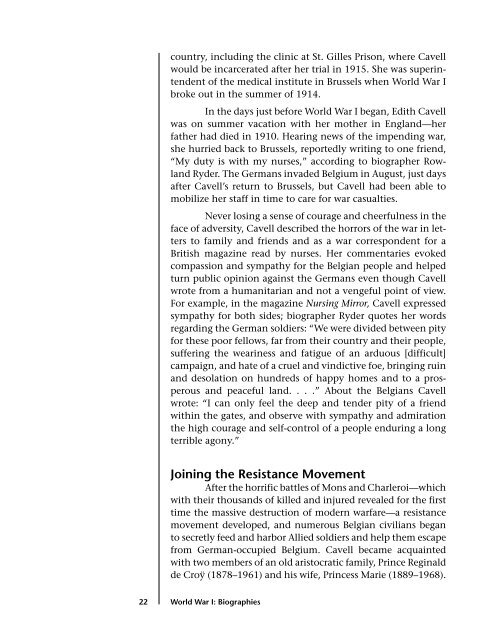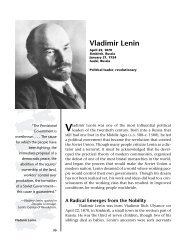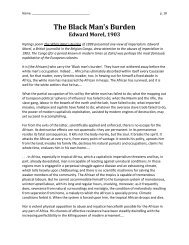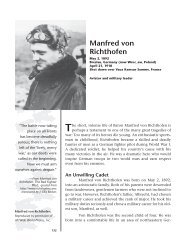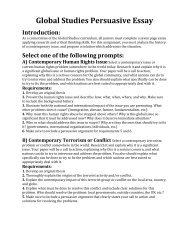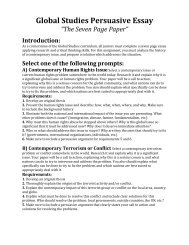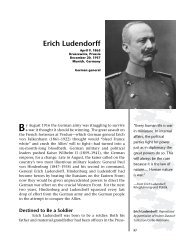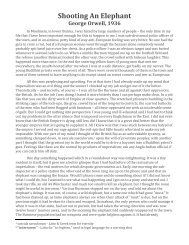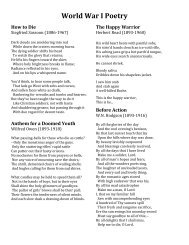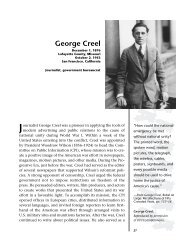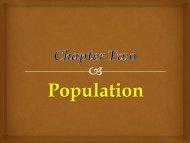Edith Cavell
Edith Cavell
Edith Cavell
You also want an ePaper? Increase the reach of your titles
YUMPU automatically turns print PDFs into web optimized ePapers that Google loves.
country, including the clinic at St. Gilles Prison, where <strong>Cavell</strong><br />
would be incarcerated after her trial in 1915. She was superintendent<br />
of the medical institute in Brussels when World War I<br />
broke out in the summer of 1914.<br />
In the days just before World War I began, <strong>Edith</strong> <strong>Cavell</strong><br />
was on summer vacation with her mother in England—her<br />
father had died in 1910. Hearing news of the impending war,<br />
she hurried back to Brussels, reportedly writing to one friend,<br />
“My duty is with my nurses,” according to biographer Rowland<br />
Ryder. The Germans invaded Belgium in August, just days<br />
after <strong>Cavell</strong>’s return to Brussels, but <strong>Cavell</strong> had been able to<br />
mobilize her staff in time to care for war casualties.<br />
Never losing a sense of courage and cheerfulness in the<br />
face of adversity, <strong>Cavell</strong> described the horrors of the war in letters<br />
to family and friends and as a war correspondent for a<br />
British magazine read by nurses. Her commentaries evoked<br />
compassion and sympathy for the Belgian people and helped<br />
turn public opinion against the Germans even though <strong>Cavell</strong><br />
wrote from a humanitarian and not a vengeful point of view.<br />
For example, in the magazine Nursing Mirror, <strong>Cavell</strong> expressed<br />
sympathy for both sides; biographer Ryder quotes her words<br />
regarding the German soldiers: “We were divided between pity<br />
for these poor fellows, far from their country and their people,<br />
suffering the weariness and fatigue of an arduous [difficult]<br />
campaign, and hate of a cruel and vindictive foe, bringing ruin<br />
and desolation on hundreds of happy homes and to a prosperous<br />
and peaceful land. . . .” About the Belgians <strong>Cavell</strong><br />
wrote: “I can only feel the deep and tender pity of a friend<br />
within the gates, and observe with sympathy and admiration<br />
the high courage and self-control of a people enduring a long<br />
terrible agony.”<br />
Joining the Resistance Movement<br />
After the horrific battles of Mons and Charleroi—which<br />
with their thousands of killed and injured revealed for the first<br />
time the massive destruction of modern warfare—a resistance<br />
movement developed, and numerous Belgian civilians began<br />
to secretly feed and harbor Allied soldiers and help them escape<br />
from German-occupied Belgium. <strong>Cavell</strong> became acquainted<br />
with two members of an old aristocratic family, Prince Reginald<br />
de Croÿ (1878–1961) and his wife, Princess Marie (1889–1968).<br />
22 World War I: Biographies


